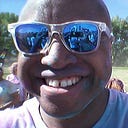Member-only story
It Was Time For Me to Step Up
November, 2012
That biopsy needled must have been at least foot long, as well as metallic, sharp, and all around frightening. To witness the thing made an already crisply chilly hospital room even colder. I looked over to the hospital bed where my dad rested, his back exposed to the world. Then I turned my attention to the nurse who was preparing to plunge the needle. I closed my eyes before the needle was to pierce the skin, and waited. I heard my dad gasp, a signal that the needle had been plunged into his tissue. It was one of the few times that I’d ever heard or seen my dad acknowledge physical pain.
*****
The next visit to the hospital would confirm my worst fears. Dad and I were sitting across the room from a bespectacled oncologist, while the paper that explained his diagnosis was shaking in my hand and twisting my heart. Dad had been diagnosed with a rare cancer of the blood and bone marrow. The diagnosis had been a gut punch to dad, sucking out all of his wind. For a while whispering the word “cancer” was all the response that he could muster.
Despite the smart looking glasses and the receding hairline, the oncologist seemed like he was a very young man, a point of concern for me. For I would have preferred someone older and more experienced. Still, he was an oncologist, and he had to be knowledgeable about…
